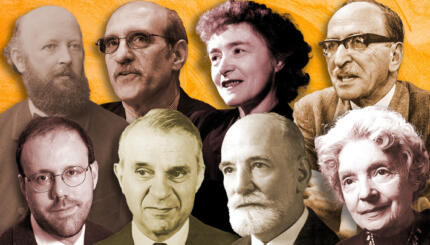“The window was open,” the bird sighed; adding after a moment, “I’m running. I’m flying but I’m also running.”
“From whom?” asked Edie with interest.
“Anti-Semeets.”
“Anti-Semites?” they all said. “That’s from who.”
“What kind of anti-Semites bother a bird?”
It is harder than it might look to classify Bernard Malamud. Is he a comic writer? The short story “The Jewbird,” featuring a “skinny bird” named Schwartz with a taste for matjes herring, is, in addition to being one of Malamud’s most beloved works of short fiction, a gem of absurdist humor. And yet, Malamud is possessed, as John Updike has it, of “that touch of traditional religious resignation which converts depression to the cosmic humor.” In novels like The Assistant (1957) and The Fixer (1966), Malamud created classic American fiction on traditionally Jewish themes: sin, redemption, guilt, and shame. Like Isaac Bashevis Singer, the writer whom he most resembled, Malamud’s nuanced understanding of Jewish culture and history created a world that is part shtetl, part ghetto, part metropolis. Malamud’s world was inescapably Jewish, and yet much of what defined it was its relation with the non-Jewish world at large.
Malamud was born in 1914. His parents were Russian Jewish immigrants, and he was raised in Brooklyn. His father owned a grocery store, much like Morris Bober in The Assistant, and his mother had had a love of the stage before dying when Bernard was 15. After attending City College and Columbia, he spent a number of years as an instructor at Oregon State University while crafting his first literary works. Malamud would go on to serve as a professor of writing at Bennington College in Vermont for decades.
Malamud’s heroes are at the mercy of larger forces that crush both the decent and the evil without compunction. In his first novel, The Natural (1952) (later adapted into a classic film with Robert Redford that changes the novel’s famously downbeat ending), Malamud created one of his most indelible characters: slugger Roy Hobbs, the onetime baseball phenom who receives a belated second chance at glory after a crazed stalker ends his first stint in the major leagues. Even this moment of on-the-field redemption, with Roy becoming the superstar he was always meant to be, is distressingly short-lived, betrayed by the disloyalties of capitalism and the sourness of romance gone bad. What could be more American than baseball, and more Jewish than Malamud’s vision of failure and deliverance?

Help us keep Jewish knowledge accessible to millions of people around the world.
Your donation to My Jewish Learning fuels endless journeys of Jewish discovery. With your help, My Jewish Learning can continue to provide nonstop opportunities for learning, connection and growth.
Malamud’s most famous novel, The Assistant (1957), offers a uniquely American take on a very traditional Jewish story of failure and uplift. It is the clammy intersection of a Jewish shopkeeper named Morris Bober and the Gentile clerk named Frank Alpine he hires to work the cash register. Unknown to Morris, Frank is the man who has robbed his store. Frank means well, but keeps slipping back into crime, letting Morris down even as the proprietor puts more and more of his faith in him. Characters are boiled down to their elemental ethnicities–“the Jew,” or “the Italian.” Frank lifts up the weary spirits of Morris and his wife’s struggling store while simultaneously committing another, more personal crime against the Bobers, developing a dangerous fixation on their daughter Helen. Frank’s guilt summons a kind of compulsion to make amends. Eventually, Frank is so wracked by guilt that he has himself circumcised and becomes a Jew, too. The joke, if there ever was one, is on him.
The Fixer (1966), which won the National Book Award and the Pulitzer Prize, was similarly astute in its depiction of the fault line between Jew and non-Jew. Inspired by the story of Mendel Beilis, perhaps the most famous 20th century blood libel victim, The Fixer similarly concerns a Jew at the mercy of larger anti-Semitic forces. In all these tales, fate can be a furious master, leaving little but wreckage in its wake.
More so than any novel of his other than The Assistant, Malamud’s legacy is to be found in his short stories, collected in The Complete Stories (1997). Malamud captures the essence of a certain immigrant brand of speech, perhaps best represented by marriage broker Pinye Salzman, in his famous story “The Marriage Broker”: “So what is the difference, tell me, between twenty-seven and thirty-two?” he argues with his latest client, a rabbinical student named Leo Finkle. “My own wife is seven years older than me. So what did I suffer?—Nothing. If Rothschild’s daughter wants to marry you, would you say on account her age, no?” Malamud’s stories offer an elemental depiction of a world where the Jew is the symbol of man adrift from God, left to find meaning in a world composed of bittersweet triumphs and failed attempts at discerning truth. As Leo Finkle tells Lily, whom Pinye Salzman introduces him to, “I think…that I came to God not because I loved Him but because I did not.”
Set in tenement buildings, in dingy stores, and among the peddlers on Canal Street, Malamud’s stories are unrelentingly grim in their subject matter. But the elegance of his parables of sin and solitude and faith, and the verve of his characters, still possessed of a passion for language even as life denies them other pleasures, redeems their forbidding bleakness.


